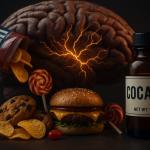Join Cameron English and Dr. Chuck Dinerstein on Episode 140 of the Science Dispatch podcast as they discuss a wildly unethical "thought experiment."
food addiction
A more controversial hypothesis has emerged: are these “Frankenfoods” addictive in ways similar to drugs?
Food Addiction Through Time
Earlier this month, The Wall Street Journal published an article on the impact of ultra-processed foods on our brains.
For those interested in listening to the entire one-hour broadcast, it is available here.
The findings are from the National Poll on Healthy Aging, a survey of a “randomly selected stratified group” of adults administered by phone or online.
After being obese for most of my life, I finally made the decision to get in shape in my early 20s.









